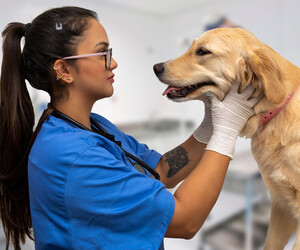Vaccination Guidelines From Your Relied On Vet
Vaccination standards given by your trusted vet play an important role in protecting your family pet's health and wellness and well-being. Core injections are basic for all pets, while non-core vaccinations can be customized to ecological exposures and certain lifestyles. Understanding the subtleties of inoculation timetables, which start as very early as six to 8 weeks, is vital for optimal defense. Additionally, dealing with typical misunderstandings bordering injections can additionally enhance animal proprietors' self-confidence in these safety nets. As we explore these essential elements, it becomes increasingly clear why regular appointments with your veterinarian are crucial for notified decision-making.

Value of Vaccinations
Inoculations play a critical role in securing pet dogs versus a range of avoidable illness. By promoting the immune system to identify and deal with certain pathogens, vaccinations significantly reduce the incidence of infectious illness that can affect a pet dog's health and durability. Not only do vaccinations protect private pets, yet they additionally add to herd resistance, therefore reducing the general occurrence of diseases in the family pet population.
Prompt vaccinations help to minimize the spread of illness such as rabies, parvovirus, and distemper, which can have serious consequences for both pet dogs and people. Inoculations are frequently a requirement for boarding facilities, grooming services, and canine parks, making them necessary for those that wish to socialize their pet dogs.

Core Vaccinations for Family Pets
While the specific vaccination demands of family pets can vary based upon private elements, core vaccinations are globally suggested to safeguard versus the most usual and severe conditions (Pet Vaccinations). Core vaccines are those regarded important for all pet dogs, regardless of their way of living or geographic place, as they safeguard against very infectious and possibly fatal diseases
For pet dogs, the core vaccinations consist of those for canine distemper, parvovirus, adenovirus (hepatitis), and rabies. Adenovirus can result in liver disease, while rabies is a zoonotic illness that presents a threat to both human beings and animals.
In felines, core vaccinations encompass feline panleukopenia, feline calicivirus, feline herpesvirus (rhinotracheitis), and rabies. Feline panleukopenia is an extremely transmittable viral disease that impacts the body immune system and intestines. Calicivirus and herpesvirus are major factors to top breathing infections in pet cats, while rabies remains a vital worry for public wellness.
Talk to your vet to guarantee your pets get their core vaccinations on timetable.
Non-Core Vaccines Explained
Non-core vaccinations are customized to address specific threats associated with a pet's way of life, exposure, and environment to certain illness. Unlike core vaccines, which are generally advised for all pets, non-core injections are thought about based upon individual circumstances. These injections are especially crucial for family pets that might run into unique pathogens because of their geographical location, traveling behaviors, or tasks.
Instances of non-core injections consist of those for Bordetella bronchiseptica, which is linked to kennel coughing, and Lyme illness, caused by ticks. Family pets that frequently connect with other pets, such as those in boarding facilities, pet parks, or brushing environments, might gain from Bordetella vaccination. If you live in an area where Lyme illness is prevalent, immunizing against this condition can be a prudent option for outdoor-loving canines.
Other non-core vaccinations may consist of those for leptospirosis, canine influenza, and feline leukemia, depending upon the certain danger elements present. It is important to have a detailed discussion with your veterinarian regarding your pet dog's way of life and the possible need for these injections, making certain a tailored vaccination strategy that best secures your furry pal.
Vaccination Set Up Review

As pets develop, it is essential to abide by the recommended booster vaccinations. Vet Enterprise. For grown-up animals, core vaccinations are normally given every one to three years, depending upon the particular vaccine and regional guidelines. Non-core vaccinations might be advised based on lifestyle elements and regional illness occurrence, requiring a customized strategy
Normal veterinary check-ups are vital for updating inoculation schedules. Your veterinarian can give support on one of the most ideal immunizations for your pet, factoring in age, health standing, and ecological risks. By remaining proactive and notified, animal owners can ensure their fuzzy buddies get prompt and reliable vaccinations, consequently securing their wellness and health throughout their lives.
Usual Misconceptions Concerning Vaccines
Misunderstandings regarding family pet vaccinations can result in complication and hesitation amongst animal owners concerning the visit site immunization procedure. One prevalent myth is that injections are unneeded for indoor family pets. While it holds true that interior pets encounter reduced threats, they are not totally immune to conditions, as pathogens can be introduced through numerous methods, consisting of human clothing and various other family pets.
Another mistaken belief is click to read more that injections can create the conditions they aim to stop. Actually, the majority of injections contain suspended or attenuated microorganisms, which can not cause illness in healthy animals. Some pet dog owners additionally believe that their pet dogs ought to not be immunized if they are already healthy and balanced; however, inoculations are a positive step that helps stop the onset of health problem.
In addition, several pet proprietors are afraid that vaccinations will lead to long-lasting health problems. The benefits of vaccination-- shielding pet dogs from possibly life-threatening illness-- much exceed the dangers.
Final Thought
In recap, adherence to inoculation standards is critical for guaranteeing the health and wellness and durability of family pets. Core vaccinations offer essential defense versus significant illness, while non-core vaccines address particular dangers based upon specific way of livings. Establishing a comprehensive inoculation routine, combined with regular veterinary check-ups, assists in optimum health and wellness management. Eliminating usual myths bordering inoculations even more enhances the relevance of notified decision-making in animal care. Inevitably, a positive technique to vaccinations is vital for keeping pet health.
Not just do vaccinations protect specific animals, yet they also add to herd immunity, therefore minimizing the overall frequency of illness in the pet dog population.
Misunderstandings about family pet vaccinations can lead to complication and reluctance amongst family pet proprietors pertaining to the booster shot process. While it's real that indoor pets encounter reduced threats, they are not totally immune to conditions, as microorganisms can be presented via various methods, including human apparel and various other animals.
Some pet dog owners likewise believe that their pet dogs should not be immunized if they are already healthy; however, vaccinations are an aggressive step that aids stop the beginning of health problem.
The advantages of inoculation-- Home Page protecting animals from potentially serious diseases-- far exceed the dangers.